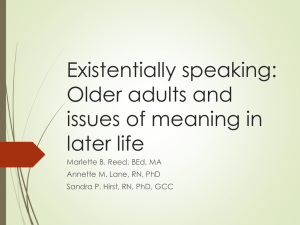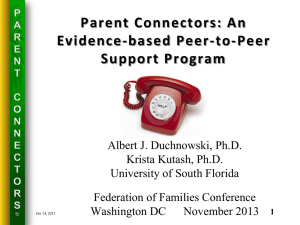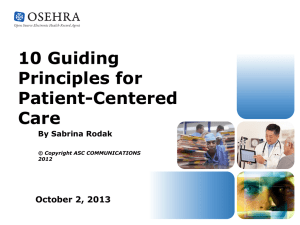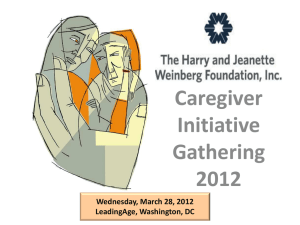Psychosocial Aspects of Palliative care
advertisement
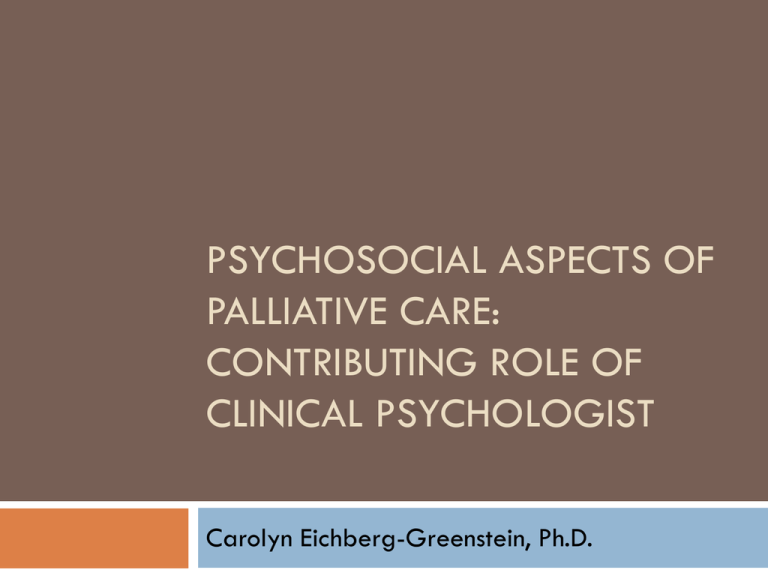
PSYCHOSOCIAL ASPECTS OF PALLIATIVE CARE: CONTRIBUTING ROLE OF CLINICAL PSYCHOLOGIST Carolyn Eichberg-Greenstein, Ph.D. Why initiate services to manage psychological needs? Knowledge of impending death has a profound psychological impact on human beings. Parkes’ (1988) concept of the ‘assumptive world’ is changed. All that one assumed was securely in place, one’s expectations about the world, relationships and place in it are thrown into disarray: one’s familiar world is undermined. Initiation of psychological services (Continued) Dying person faces many losses in the time leading up to physical death: loss of health, occupation, body image, capacities, pleasures, relationships, ability to care for oneself, and of a future self. Bowlby’s (1980) loss theory view of the grieving process is that people feel the pain of loss, and progress from numbness, to protest, despair, detachment; then to reorganization or integration. Initiation of psychological services (Continued) No single trajectory plots a linear path of grief. People vacillate; all the reactions or stages proposed in the literature don’t tell how one individual will respond. Each person faces death in his/her own way, some with complete avoidance, others with terror, and some with anticipation. Enable time for psychological care Difficult issue for the dying person and the family is there is often little time for psychological tasks involved in the grieving progression. With malignancy, period may be short from time at which there is no more tx available to death. With dementia, there may be even more uncertainty. Dying persons need help to rebuild their assumptive world and redefine their sense of identity. Psychologists as part of the Palliative Care Interdisciplinary Team Good care is distinguished by recognition of the psychosocial needs of dying pts and their families. There is an increasing recognition of the value of psychological perspectives/interventions in the care of patients with advanced disease and support of their bereaved families. Psychologists have usually played an ancillary role in hospice care; yet are more often utilized in palliative care programs. Who gets referred for psychological services? Many pts have preexisting mental health conditions. Others have diagnoses that may be exacerbated by life-limiting disease. Pts with advanced dementia may exhibit behavior that challenges caregivers such as agitation, or psychological aspects that may be a problem for the patient, such as apathy. For those whose mental response does not rise to the level of a mental disorder, many still experience significant psychological distress. When is the appropriate time for Psychological Consultation? Psychologists can contribute to end-of-life care through interventions at 4 times in the lives of patients and their families: (a) before illness strikes; (b) after illness is diagnosed and treatment begins; (c) during advanced illness and the dying process; (d) after the death of the patient, with bereaved survivors. Before Life-Limiting Illness Strikes Psychologists are accustomed to talking with patients about mortality; thus, they can encourage advance care planning and completion of advance directives that are consistent with the patients’ personal values and can later guide medical care. After Life-Limiting Illness is Diagnosed Time of diagnosis can be difficult and uncertain for pts, associated with a range of emotional reactions. Psychologists can assist pts in managing these feelings, making sense of their diagnosis, communicating treatment preferences to their medical providers and family, using effective coping responses, and mobilizing social support/services. Advanced IIlness and the Dying Process Transition from curative treatment to care focused on disease and symptom management requires significant adjustment for patients and family members. Psychologists can assist with anticipatory grief and adjustment reactions, mental disorders, existential and spiritual issues, advance care planning, life review, and unresolved issues that are likely to surface as meaningful concerns. Advanced Illness and the Dying Process (Cont’d) Psychologists can provide interventions that decrease symptom intensity and increase a sense of control. They can help patients and family members explore fears and apprehensions and to communicate needs and concerns to their medical team. They can teach cognitive coping skills (e.g., relaxation, breathing, meditation, distraction, or imagery), communication skills, and goal setting. Family members can be taught these techniques and enlisted as coaches. Bereavement The ending of the patient’s life marks the beginning of a changed life for survivors. Psychologists can be alert to the signs of complications in the bereavement process, providing assistance to more profoundly distressed survivors in adapting to a world in which their loved one is absent. A Statement of Assumptions and Principles Concerning Psychosocial Care of Dying Persons and Their Families The International Work Group (IWG) on Death, Dying, and Bereavement is a voluntary, nonprofit organization comprised of leaders in the field. Formed in 1974 to help promote & advance understanding of the needs of dying persons and their families. The intent of this document was to counteract the tendency to focus too much on physical and medical care. Issues for the Dying Patient The IWG developed 14 assumptions and principles that address the important psychosocial issues facing dying persons and offer advice about handling them. 1) Dying persons may choose to acknowledge or not acknowledge their impending death. Caregivers must recognize/respect the person’s right to deny or not communicate about impending death. Caregivers must help family members and others in understanding or accepting the dying person’s position, which may change with time. 2) Dying persons can communicate about impending death in different cultural ways. Caregivers must seek understanding and knowledge of the dying person’s cultural and life-style experiences. Caregivers need to be sensitive to nonverbal and symbolic ways of communicating and recognize that these modalities may be more significant to the dying person than verbal expression. 3) Dying persons have right to information on changing physical status, and whether/not to be told they are dying. Caregivers need to be sensitive and perceptive to the different ways the person may be requesting information about his or her condition. 4) Dying persons may be preoccupied with dying, death itself, or what happens after death. The caregiving team needs to be aware of the dying person’s concerns and fears in order to provide care that is responsive and supportive. 5) Dying persons can have a deep-seated fear of abandonment. Pts may continue tx for the sake of family or doctor rather than believing it will be of personal benefit. Caregivers can be helpful in identifying feelings that may affect treatment decisions. Caregivers can be helpful in opening communication between the dying pt and family or physician that may clearly reflect the pt’s goal for treatment. 6) Many dying persons experience multiple physical and psychological losses before death. Caregivers may be helpful in facilitating the expression of grief related to the multiple losses. Caregivers may also be helpful in supporting the dying person’s need for continued autonomy, satisfying roles and activities, and meaning. 7) Dying persons exhibit a variety of coping strategies in facing death. Caregivers need to recognize the utility of adaptive coping mechanisms and be tolerant of the patient’s or families’ need to use or abandon such strategies. Caregivers can help foster an environment that encourages use of effective ways of coping by accurately addressing the dying person’s concerns. 8) Dying persons generally need to express feelings. Dying persons should not be isolated but given the opportunity to communicate. 9) Dying persons communicate when they feel safe and secure. Caregivers should create an environment in which communication can be facilitated, paying special attention to physical comfort, symptom management, physical surroundings, privacy, confidentiality, adequate time, acceptance of feelings and shared expectations. 10) Dying persons may find it helpful to communicate with others who are terminally ill. Opportunities should be encouraged for patient interaction, such as peer or professionally facilitated support groups, social functions, or designated areas within treatment settings where patients may informally gather. 11) Dying persons’ communication of concerns may be inhibited by psychosocial and cultural expectations. Caregivers can be helpful in breaking through the barriers that inhibit the dying person’s true expression of feelings about death. 12) Dying persons have a right to be acknowledged as living human beings until their death. Even when they seem severely impaired, dying persons are still able to sense their surroundings. Caregivers need to facilitate this awareness. Caregivers should encourage behavior, touch, and communication, which continue to demonstrate respect for the dying person. 13) Dying persons’ psychological suffering may be greater than physical pain or discomfort. Caregivers should recognize and attend to, the psychological component of suffering. 14) Dying persons may have difficulty dealing with different needs of family members. Caregivers need to be aware of family dynamics and recognize the importance of dealing with individual members as well as the family unit. Caregivers should be sensitive to presence of conflicts between family members, and may need to maintain a position of neutrality to be effective. Issues for Families The IWF also developed as assumptions and principles to address the psychosocial issues facing the dying person’s family. The IWF defines family as those individuals who are part of the dying person’s immediate attachment network, regardless of blood or matrimonial ties. 1) Families have fundamental needs to care and be cared for. Families should be encouraged to provide whatever care they can. Caregivers should not supplant the family in the caregiver role except where the family lacks physical or emotional resources, knowledge, or desire to provide care. By providing care to family members, caregivers may be better able to care for the dying person. 2) The need to care and the need to be cared for sometimes conflict. Those who sacrifice their own needs for care in order to care for others need to be encouraged to accept help for themselves. Some need to receive care before they can give care. 3) People vary in their coping abilities & personal resources. Competing priorities may hamper the amount and quality of care people are able to give. Caregivers should not impose their own expectations on a family’s ability to care. Caregivers may need to explore with the family what is reasonable for each person to provide. 4) The approach of death may disrupt the structure and functioning of the family. Many families need counseling and support to prepare for the dying person’s death and its consequences. 5) Families need information, but in cases of conflict dying pt’s desire for confidentiality must be respected. The dying person and caregiving team share the responsibility for informing the family about the person’s condition, depending on the person’s ability to participate. Whenever possible, the dying person and appropriate caregivers need to agree on the source and extent of information given to the family. 6) Families often need to be involved with the dying person in decision making. Guided by the dying person’s wishes, caregivers can be helpful in facilitating joint decision making. 7) Families have right to know their affairs will be shared only with those that have a right to know. Confidentiality must be maintained at all times and its meaning taught to all caregivers. 8) Family members need to maintain self-esteem and self-respect. Caregivers should show respect at all times. Caregivers do this by paying attention to family wishes, feelings, and concerns. 9) Sexual needs may continue up to the point of death Caregivers should acknowledge dying persons’ and their partners’ need to express their sexuality both verbally and physically, with easy access to privacy without embarrassment. 10) Families with terminal illness frequently have financial concerns. Caregivers need to assure that families have access to informed advice and assistance on financial issues. These issues represent present or anticipated problems that may or may not be realistic. 11) Faced with death, the family may imagine that changes will be greater than they are. Caregivers can often allay fears with information and support. 12) Families have a need/right to express grief for multiple losses and for impending death. Caregivers can help families by encouraging communication between families and the dying person about their shared losses associated with illness, and encouraging the expression of grief. Issues for the Caregivers The IWF developed 6 assumptions and principles that address the psychosocial issues facing caregivers and offer advice about handling them. 1) Caregivers need education/experience re: the psychosocial needs of dying persons and their families. A combination of specialized courses in death and dying, and clinical practicums in care of the terminally ill and their families, may help us to prepare caregivers to address the physical and psychosocial needs of dying persons. 2) Caregivers need to be aware of the dying person’s and family’s psychosocial frame of reference. Caregivers need to be sensitive to the dying person’s and family’s current willingness to acknowledge the reality of their situation. Caregivers must not impose their own expectation of how dying persons cope with impending death. 3) Caregivers bring their own values, attitudes, feelings, and fears into the setting. Caregivers must recognize that they cannot take away all the pain experienced in the dying process. Caregivers need to be reassured that it is not a lack of professionalism to display and share emotions. Caregivers need to be aware of the way their coping strategies affect their communication of emotional involvement with the dying person and family. 4) Caregivers are exposed to intense emotional experiences, loss, and confrontation w/their own death. Caregivers need to receive adequate support and opportunity to work through their own accumulated emotions. Caregivers working with dying persons need sound motivation, emotional maturity, versatility, tolerance, and a special ability to deal with loss. 5) Caregivers sometimes experience conflicting family needs and requests for information and confidentiality. Caregivers need to be prepared to deal with complex family dynamics and to assist family groups in resolving their own conflicts. 6) Caregivers may not communicate with each other about their own needs and feelings. Caregivers need to be tolerant, caring, and nonjudgmental with each other in order to promote cooperation that will benefit the dying person’s care. Sensitivity to Psychosocial Assumptions Some believe dying patients should be offered an opportunity for growth by suggesting ways they can develop themselves at the end of life. Others feel that the patient should determine the agenda and encouraging the patient to deal with death and dying issues is too intrusive. There is some truth to both positions. Dying patients and their families, don’t have prior experience on how best to die. Guidelines for Psychotherapeutic Intervention The dying person has to set the agenda. Direct efforts at tying up loose ends, not uncovering issues. Dying pts can more quickly develop a close working relationship. Whereas, it is tempting to want to do more in-depth psychotherapy, it is critical to work only toward resolution. Psychologists can do an oral history of the pt’s life, including important family milestones, value or beliefs to impart, instructions for survivors and genealogical information. Short-term Objective of Psychotherapy “The more complete one’s life is, the more…one’s creative capacities are fulfilled, the less one fears death…People are not afraid of death per se, but of the incompleteness of their lives.” (Lisl Marburg Goodman) The need to make meaning is very common among patients at the end of life . Helping them discover a coherent narrative to their life and be able to put their lives and impending death in a context that fits the narrative can be a powerful intervention. References Bowlby (1980). Attachment and loss: Sadness and depression (Vol. III). NY: Basic Books. Connor, S.R. (2009). Hospice and Palliative Care: The Essential Guide, Second Edition. NY: Routledge. Halley, W.E., Larson, D.G., Kaul-Godley, J., Neimeyer, R.A., & Kwilosz, D.M. (2003). Roles for psychologists in end-of-life care: Emerging models of practice. Professional Psychology: Research and Practice, 34(6), 626-633. References (cont’d) Jeffreys, J.S. (2005). Helping Grieving People-When Tears Are Not Enough: A Handbook for Care Providers. NY: Routledge. Parkes, C.M. (1988). Bereavement as a psychosocial transition: Process of adaptation and change. Journal of Social Issues, 44, 53-65.

